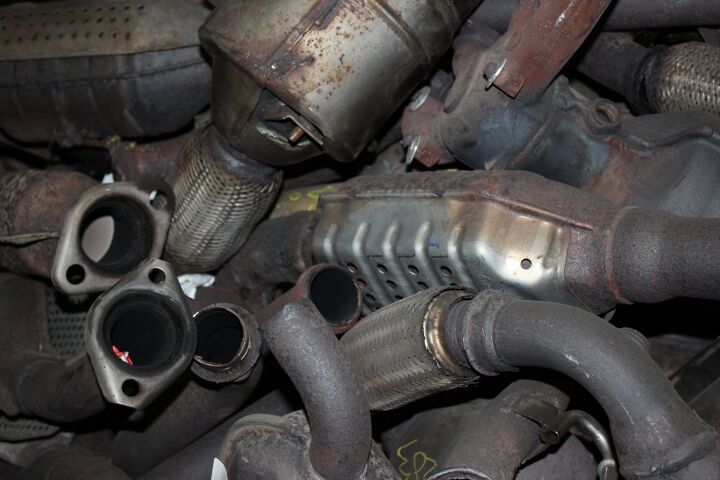Gubbmint Introduces Bill to Curb Catalytic Converter Theft

Hands up if you or someone you know has had a brush with catalytic converter theft. Packed with valuable metals, unsavory sorts have been helping themselves to this easily accessible part of a car’s exhaust system, often attacking it with a reciprocating saw and making away with the item in just a few seconds. Now, the government is (re)introducing a bill that may help curtail thefts.
Called the Preventing Auto Recycling Thefts Act (or the PART Act, aren’t they clever), the bi-partisan bill aims to reduce catalytic converter theft by requiring automakers to stamp a VIN or other identifying information onto the part’s surface. The hope is that thieves will think twice before stealing the converter if they know it can be traced back to a particular car, not to mention the supposed ease of identifying a car to which a converter belongs if a bunch of the things is recovered in a bust or chop shop raid.
As per usual, politicians bloviated at length about this initiative, with Congress member Jim Baird saying they “want to empower our law enforcement to hold these thieves accountable,” and Congress member Betty McCollum saying the proposed legislation is one way of “providing tools for investigators to link stolen catalytic converters to the vehicles from which they were stolen.” Fair enough, then.
Apparent loopholes or gaps in the existing criminal code language allegedly mean that cops must catch a criminal in the act of removing the part in order to prosecute a case. We’re not sure if VINs or other identifying information hammered into a catalytic converter will deter the most hardened of criminals, but averting even one theft can be construed as a win. Such a requirement will create more work for car companies, though they surely have existing procedures on which they can draw to pair individual VINs with converters as they arrive at a factory.
The National Insurance Crime Bureau says the number of reported catalytic converter thefts rose from 3,389 in 2019 to 14,433 in 2020. More recent numbers – with different bookends – from insurance company State Farm estimate the problem in an even harsher light, saying that between July 2021 and June 2022 catalytic converter theft more than doubled during that period when over 43,000 of these parts were reportedly taken.
[Image: fru-fru/Shutterstock]
Become a TTAC insider. Get the latest news, features, TTAC takes, and everything else that gets to the truth about cars first by subscribing to our newsletter.

Matthew buys, sells, fixes, & races cars. As a human index of auto & auction knowledge, he is fond of making money and offering loud opinions.
More by Matthew Guy
Latest Car Reviews
Read moreLatest Product Reviews
Read moreRecent Comments
- ToolGuy I'm several months behind on doing the homework, can't talk now.
- Tele Vision As a V1 owner I opine that Cadillac should be GM's version of AMG. i.e.: Regular Equinox with an inline 4 or V6; and an Equinox V with a twin-turbo V6; lowered; and appointed with many peeled cows - at twice the price. It'd sell. V all the things!
- Jeff Not really bad just mostly oil changes.
- Jeff Thanks again Corey for this Eldorado series.
- Scott I seriously doubt that they will be in business within three years. They are phasing out popular models and not replacing them. Durango is going to disappear next. They say that the elevators don’t stop on many mid level floors at the Stelantis HQ. They have let many designers and engineers go. Pretty soon the customers will get a clue that they shouldn’t bother stopping at a Stelantis dealership!































Comments
Join the conversation
New California laws require recyclers to keep specific records on the parts they buy and sell, and require used catalytic converters to be sold only by authorized parties.
How about reimbursing victims with the $500M the Feds confiscated from the crooks that got caught selling the rare metals ? ~$3,000 to repair...my local police have a list or social media !!